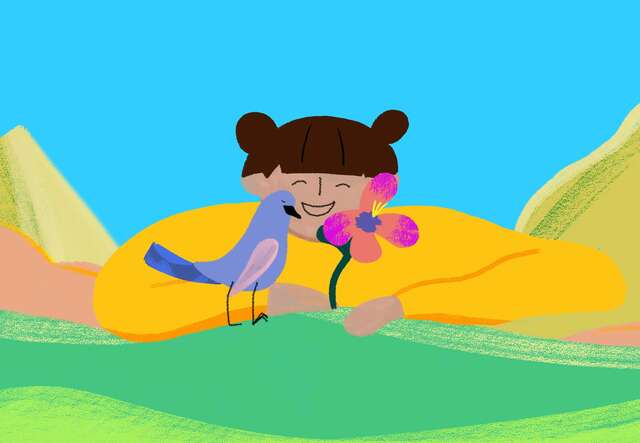
Talking to kids about mental health
The International Rescue Committee’s Healing Classrooms programme provides training and resources to teachers and support staff of refugee students

The International Rescue Committee’s Healing Classrooms programme provides training and resources to teachers and support staff of refugee students
For children who have experienced trauma, the impacts on their mental health and ability to learn can be huge.
That's why creating safe, nurturing spaces for them to thrive in is so crucial. The International Rescue Committee's Healing Classrooms programme aims to do just that by developing inclusive environments where children can begin to recover from the impact of trauma.
Roya Tobin, an English as an Additional Language (EAL) teaching assistant at a primary school in Beenham, has witnessed how the Healing Classrooms approach supports refugee and asylum-seeking children in particular.
Roya - who is a fluent Farsi speaker - was first asked to support at her 10-year-old son’s school when 16 displaced children from Afghanistan joined from November 2021.

Having moved to the UK from Iran with her family when she was just three-years-old, Roya could understand firsthand the challenges young people face in adapting to a new culture.
"When I was young, I felt marginalised and unsupported at school," she said. "Teachers didn't make an effort to understand where I came from. You felt like an 'other' who didn't belong."
While providing language support to the children, Roya took part in the Healing Classrooms training so she could adopt trauma-informed care. Here’s how she approaches talking to children about their mental health…
When working with young children who have experienced trauma, it's crucial to allow them the space and time to open up at their own pace. Roya shared the importance of never pressuring students to speak about their experiences before they are ready.
Simple things, like sharing a laugh together, can help break through barriers and create a safe environment for children to gradually feel comfortable. Roya recalled one example of how she earned the trust of her students by finding shared moments of connection.
There were twins from Syria and a girl from El Salvador who were all very reserved when they first arrived, not relaxed at all. I sat around the table with them, thinking 'what can I do to help them feel at ease?' I playfully called them by the wrong names, and suddenly they erupted into laughter. It was the most amazing thing to see their body language change so quickly. You don't need to speak the same language for that kind of connection.
Taking part in the Healing Classrooms training, Roya was provided with guidance on listening to children who have experienced trauma.
This includes never asking a child to share their story until they are ready, giving them uninterrupted space to speak, and showing active listening through body language.
Taking the time to truly learn about children as individuals is crucial when addressing mental health, said Roya.
To welcome these children into our school, learn about them...They were all different. Their journeys were different. Their reactions to being in the school were different. It’s important to take the time to learn about each child. We learned about their culture, we learned about the things they liked and the songs they liked. When you get to know children as personalities, it builds trust and they are able to really flourish and become more confident.
By making the effort to understand their unique backgrounds, interests and perspectives, it creates an environment where children feel safe to open up about their emotions.
With Roya working in a small village school, this made it easier to work closely with the children’s families and create a community feel.
"There are barely 60 children in the school, that means there’s more time and space for these children to integrate,” Roya said.

The Healing Classrooms approach emphasises the importance of creating a sense of belonging to ensure children get the most out of their learning and feel a sense of dignity in their identity.
Seeing their culture reflected in their new school, having opportunities to build friendships and feeling like teachers are invested in them and their families, are all vital for children to feel as though they are becoming a part of a new community.
The All About Me Booklet is a useful resource for teachers and young students to share their story and learn about each other.
At Roya's local school, there is a strong emphasis on mental health advocacy, which allows children time to think about their emotions.
Our school is very much in the advocacy and promotion of mental health. We have mental health weeks, a wellbeing lead with a psychology background, an emotional literacy support assistant, and an EAL (English as an additional language) approach with pastoral care.
Roya explained this supportive environment has been especially crucial for children who have been displaced as their difficult journeys have noticeably impacted their mental health.
To best support these students, Roya used the techniques she was taught in the trauma-informed training from the Healing Classrooms course and sessions on toxic stress.
This aims to help staff learn about the key psychological impacts of trauma on children's brain development, behaviour and learning. It explores different techniques that can be adopted to support children’s mental health including meaningful praise, allowing space for reflection, and mindfulness.
"That material has been very much a companion to reinforce the different approaches that would be the best things to adopt for these children," Roya said.
The International Rescue Committee responds to the world's worst humanitarian crises. We help to restore health, safety, education, economic wellbeing and power to people devastated by conflict and disaster. And we are proud to fight for a world where women and girls have an equal chance to succeed.
Read more about the International Rescue Committee in the UK